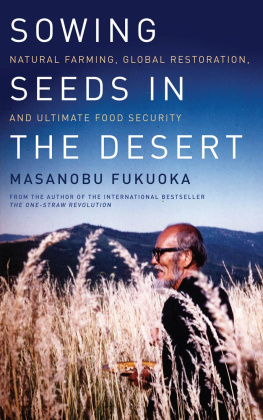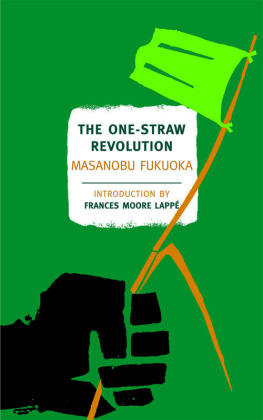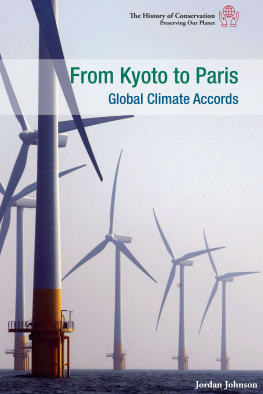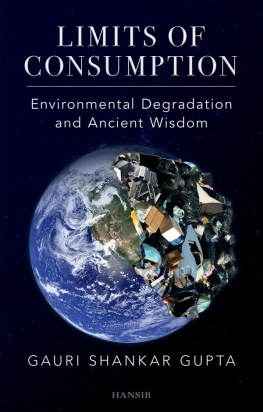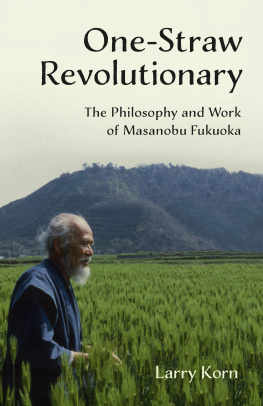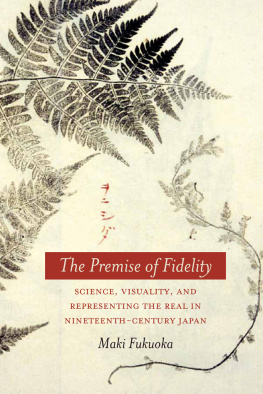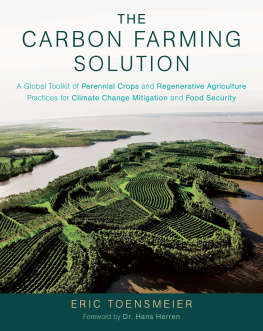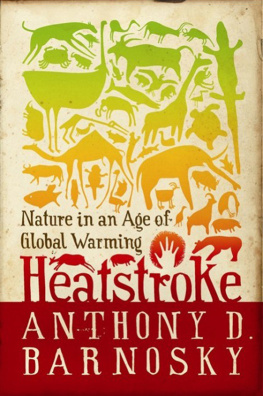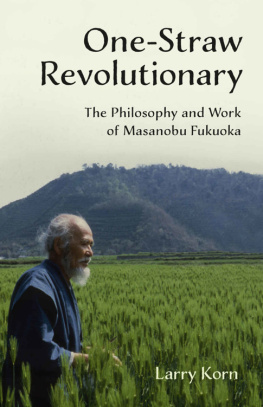Praise for Sowing Seeds in the Desert
Masanobu Fukuoka ran a course on natural farming and gave our Howard lecture at Navdanyas biodiversity farm in the Doon Valley of India, and we even have a cottage named the Fukuoka hut. He was a teacher ahead of his time. Sowing seeds in the desert is what all of humanity has to learn to do, whether it is in an economic desert created by Wall Street or an ecological desert created by globalized corporate agriculture.
Vandana Shiva , founder of Navdanya Research Foundation for Science, Technology, and Ecology
Distilling what he has gathered from a lifetime of learning from nature, Masanobu Fukuoka offers us his gentle philosophy and a wealth of practical ideas for using natural farming to restore a damaged planet. Sowing Seeds in the Desert will persuade any reader that the imperiled living world is our greatest teacher, and inspire them to care for it as vigorously as Fukuoka has.
Toby Hemenway , author of Gaias Garden
From our first meeting with Fukuoka-sensei in the late 1970s at Green Gulch Farm Zen Center, he has served as a primary guide, teacher, and inspiration in the engaged practice of organic farming and Zen meditation. Now, with Sowing Seeds in the Desert , Fukuoka-senseis teaching of natural farming continues to grow, sending deep roots down into the terrain of global restoration and food security for a hungry world. This wonderful book is to be celebrated and savored for its grounded, encouraging wisdom.
Wendy Johnson , author of Gardening at the Dragons Gate
This book is not a breath of fresh air, its a howling gale from the East. It challenges us to think outside our normal, rational frames and venture into a whole new way of relating to spirituality, the Earth, and the growing of food. As I read, I was tempted to pick holes in Fukuokas prescriptions for greening the worlds deserts, but I kept coming back to the inescapable fact that he farmed his own land according to these principles over many years and produced a lot of food.
Patrick Whitefield , author of The Earth Care Manual
Fans of Fukuokas The One-Straw Revolution will be delighted by Sowing Seeds in the Desert , his last book. It is a rich treasure trove detailing how his own philosophy of farming evolved and how he decided to apply what he learned on his own farm in Japan to other parts of the world. His insights into the tragedies of taking Western, industrial agriculture to places like Africa to enrich the national economy, and his alternative approach of working with indigenous farmers to enable them to become self-sufficient are instructive for all of us.
Frederick Kirschenmann , author of Cultivating an Ecological Conscience: Essays from a Farmer Philosopher
This book is a bombshell. Forget the gentle and retiring farmer of The One-Straw Revolution fame, replaced now by a flaming, world-traveling revolutionary. To achieve the kind of natural farming that can avoid worldwide collapse, Masanobu Fukuoka bluntly and fearlessly insists that we must first reject traditional ideas about God, the afterlife, accepted economic systemsespecially capitalism, much of current agricultural thinking including organic farming, and even parts of science that he says are based on mistaken notions about the connection between cause and effect. Once we return to a way of life dictated by nature, not institutional religions, he says, we can apply his unorthodox farming methods to make the deserts bloom and the green fields stay lush without much expense or even labor involved. Be prepared to be mystified, irritated, shocked, and maybe even, if you persevere to the end, enlightened and encouraged by this trail-blazing book. Disagree with Fukuokas provocative pronouncements at your own risk. Some of what he predicted in this book, originally written in Japanese in the 1990s, has already happened, especially the collapse of the Japanese economy in recent years and the spread of deserts throughout the world.
Gene Logsdon , author of A Sanctuary of Trees
Copyright 2012 by The Masanobu Fukuoka Estate
Translated into English and adapted from the book originally published in Japanese in 1996 by Shou Shin Sha, Japan, as The Ultimatum of God Nature .
All rights reserved. No part of this book may be transmitted or reproduced in any form by any means without permission in writing from the publisher.
English adaptation by Larry Korn
Unless otherwise noted, all illustrations copyright 2012 by The Masanobu Fukuoka Estate.
Project Manager: Hillary Gregory
Developmental Editor: Makenna Goodman
Copy Editor: Laura Jorstad
Proofreader: Helen Walden
Designer: Melissa Jacobson
Printed in the United States of America
First printing April, 2012
10 9 8 7 6 5 4 3 2 1 12 13 14 15 16
Our Commitment to Green Publishing
Chelsea Green sees publishing as a tool for cultural change and ecological stewardship. We strive to align our book manufacturing practices with our editorial mission and to reduce the impact of our business enterprise in the environment. We print our books and catalogs on chlorine-free recycled paper, using vegetable-based inks whenever possible. This book may cost slightly more because it was printed on paper that contains recycled fiber, and we hope youll agree that its worth it. Chelsea Green is a member of the Green Press Initiative ( www.greenpressinitiative t ), a nonprofit coalition of publishers, manufacturers, and authors working to protect the worlds endangered forests and conserve natural resources. Sowing Seeds in the Desert was printed on FSC-certified paper supplied by Thomson-Shore that contains at least 30% postconsumer recycled fiber.
Library of Congress Cataloging-in-Publication Data
Fukuoka, Masanobu.
Sowing seeds in the desert : natural farming, global restoration, and ultimate food security / Masanobu Fukuoka ; edited by Larry Korn.
p. cm.
Translated into English and adapted from the book originally published in Japanese in 1996 by Shou Shin Sha, Japan, as The Ultimatum of God, Nature.
Includes bibliographical references.
ISBN 978-1-60358-418-0 (hardcover) ISBN 978-1-60358-419-7 (ebook)
1. Desert reclamation. 2. DesertificationControl. 3. Revegetation. I. Korn, Larry. II. Title.
S613.F85 2012
631.6'4--dc23
2012007330
Chelsea Green Publishing
85 North Main Street, Suite 120
White River Junction, VT 05001
(802) 295-6300
www.chelseagreen.com
To those who will plant seeds in the desert.
Masanobu Fukuoka
December, 1992
Contents
Masanobu Fukuoka (19132008) was a Japanese farmer and philosopher from the island of Shikoku. His natural farming technique requires no machinery or fossil fuel, no chemicals, no prepared compost, and very little weeding. Mr. Fukuoka did not plow the soil or hold water in his rice fields all season long as farmers have done for centuries in Asia and around the world. And yet, Mr. Fukuoka got yields comparable to or higher than the most productive farms in Japan. His method created no pollution, and the fertility of his fields improved with each season.
This technique is a demonstration of Mr. Fukuokas back-to-nature philosophy. His message is one of vision and of hope. It shows the way to a brighter future for humanity, a future where people, nature, and all other forms of life live peacefully together in abundance.
The first o f Mr. Fukuokas books to be translated into English was The One-Straw Revolution : An Introduction to Natural Farming (Rodale Press, 1978). As the subtitle suggests, this book was meant as an introduction both to his worldview and to the farming methods he developed in accordance with it. In the book he told the story of how he came to farm in the way that he did, with an overview of his philosophy and farming techniques. He also gave his views about such things as diet, economics, politics, and the unfortunate path humanity has chosen by separating itself from nature.

